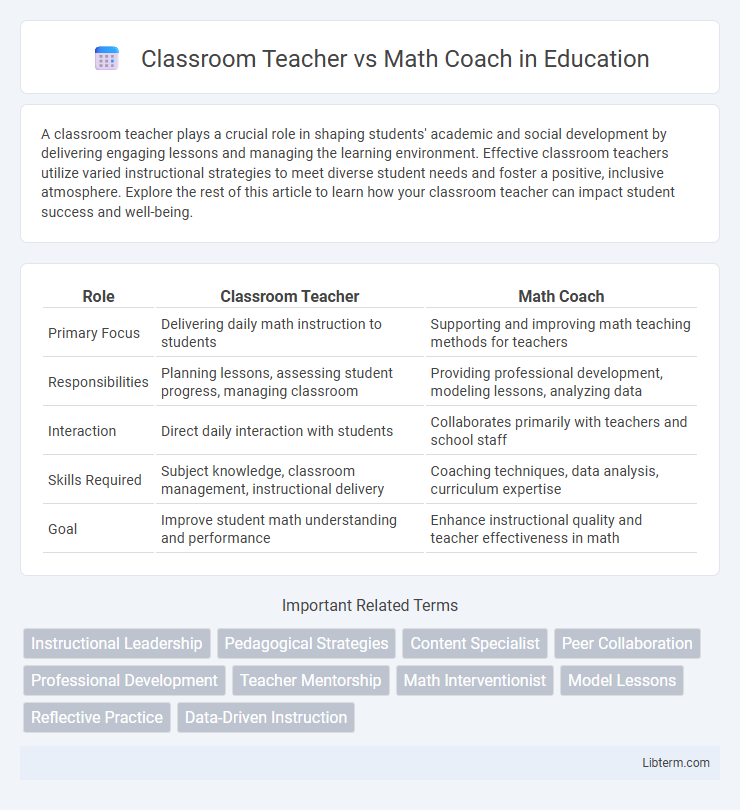A classroom teacher plays a crucial role in shaping students' academic and social development by delivering engaging lessons and managing the learning environment. Effective classroom teachers utilize varied instructional strategies to meet diverse student needs and foster a positive, inclusive atmosphere. Explore the rest of this article to learn how your classroom teacher can impact student success and well-being.
Table of Comparison
| Role | Classroom Teacher | Math Coach |
|---|---|---|
| Primary Focus | Delivering daily math instruction to students | Supporting and improving math teaching methods for teachers |
| Responsibilities | Planning lessons, assessing student progress, managing classroom | Providing professional development, modeling lessons, analyzing data |
| Interaction | Direct daily interaction with students | Collaborates primarily with teachers and school staff |
| Skills Required | Subject knowledge, classroom management, instructional delivery | Coaching techniques, data analysis, curriculum expertise |
| Goal | Improve student math understanding and performance | Enhance instructional quality and teacher effectiveness in math |
Introduction to Classroom Teacher vs Math Coach
Classroom teachers deliver daily instruction, manage student learning, and assess academic progress within the classroom environment. Math coaches support teachers by providing specialized expertise in mathematics pedagogy, offering tailored professional development and instructional strategies to improve student outcomes. Their collaborative roles enhance overall math instruction through targeted guidance and resource sharing.
Roles and Responsibilities Defined
Classroom teachers focus on delivering daily instruction, managing student behavior, and assessing individual progress to meet curriculum standards. Math coaches support teachers by providing targeted professional development, analyzing student data to improve instruction, and modeling effective teaching strategies. Both roles collaborate to enhance student achievement, but classroom teachers handle direct student interaction while math coaches focus on teacher growth and instructional quality.
Core Skills and Qualifications
Classroom teachers require strong instructional skills, classroom management, and subject matter expertise to deliver effective lessons and assess student progress. Math coaches must possess advanced mathematical knowledge, coaching abilities, and leadership skills to mentor teachers and implement curriculum improvements. Both roles demand excellent communication, collaboration, and ongoing professional development to maximize student achievement in mathematics.
Daily Workflows and Interactions
Classroom teachers focus on direct instruction, lesson planning, student assessments, and daily classroom management, fostering individual student engagement through hands-on activities and immediate feedback. Math coaches collaborate with teachers by analyzing student data, modeling instructional strategies, and leading professional development sessions to improve math teaching practices across classrooms. Their interactions often include co-planning lessons, observing classes, and facilitating reflective discussions to align instructional goals and enhance student achievement in mathematics.
Impact on Student Learning Outcomes
Classroom teachers directly influence student learning outcomes through daily instruction, tailored feedback, and classroom management that fosters an engaging and supportive environment. Math coaches enhance these outcomes indirectly by providing teachers with targeted professional development, instructional strategies, and curriculum support to improve mathematical understanding. Effective collaboration between classroom teachers and math coaches leads to improved student achievement by combining expert teaching practices with guided instructional improvement.
Collaboration with School Staff
Classroom teachers and math coaches collaborate closely to enhance instructional strategies and student learning outcomes. Math coaches provide targeted support, modeling best practices and analyzing data to inform teaching methods, while classroom teachers implement tailored lesson plans and share classroom insights. This partnership fosters professional development and creates a cohesive educational environment focused on continuous improvement.
Professional Development Opportunities
Classroom teachers and math coaches both benefit from targeted professional development, but their opportunities often differ in focus and scope. Classroom teachers engage in workshops and training sessions that enhance instructional strategies and classroom management skills specific to diverse learners. Math coaches participate in advanced sessions centered on curriculum design, data analysis, and instructional leadership to support teachers and improve math achievement across schools.
Challenges and Solutions in Each Role
Classroom teachers face challenges such as managing diverse student needs while delivering curriculum standards, requiring strong classroom management and differentiated instruction strategies. Math coaches encounter obstacles in effectively supporting teachers' professional development and overcoming resistance to new instructional practices, which can be addressed through collaborative coaching models and data-driven feedback. Solutions for both roles emphasize continuous learning, clear communication, and tailored support systems to enhance teaching quality and student outcomes.
Career Pathways and Advancement
Classroom teachers typically begin their careers focused on direct student instruction, gaining experience and certification in grade-specific or subject-specific education, such as elementary or secondary math. Math coaches often transition from teaching roles after acquiring advanced degrees in education or specialized training in coaching strategies, emphasizing mentoring, curriculum development, and professional development for teachers. Career advancement for classroom teachers may lead to roles such as department head or instructional coordinator, while math coaches often progress to leadership positions like curriculum specialists, instructional coaches across subjects, or education consultants.
Choosing the Right Fit: Which Role Suits You?
Classroom teachers excel in direct student interaction, lesson planning, and daily instruction, fostering foundational math skills and classroom management. Math coaches specialize in mentoring educators, analyzing student data, and promoting effective teaching strategies to improve overall math achievement across classrooms. Selecting the right role depends on whether you prefer hands-on teaching with students or guiding teachers to enhance math instruction schoolwide.
Classroom Teacher Infographic

 libterm.com
libterm.com